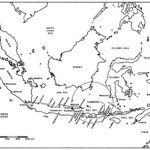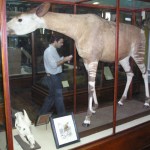Social Sciences
Tambora, Indonesia
There are big eruptions, then there are big eruptions. On April 10, 1815, Tambora, a volcano in Indonesia, produced one of the largest eruptions in human history. This eruption produced what became known as the "year without a summer" after the volcanic aerosols from the eruption produced some of the coldest summers in many parts of the world. The Tambora eruption in 1815 was a VEI 7, on a scale that goes to, well, 7*, putting it in a class of some of the largest and most violent eruptions imaginable - and I, for one, can hardly imagine what might happen if an eruption of…
Welcome to day 3 of Stuffed Megamammal Week. So far (day 1, day 2) we've looked at bovids. Now for something completely different. Yes, it's that wonderful, charismatic, beautiful African mammal, the Okapi Okapia johnstoni. Again, this specimen is on display at the National Museum of Ireland in Dublin, and sorry the photos aren't that great: the specimen is faded relative to the real thing, and this photo has been further muted by my atrocious camera skills [Gareth Dyke in background].
Okapis are very neat beasts, well known for their velvety, dark brown to purplish, striped coat. Their fur…
I was going to ignore the open letter-to-the-president advertisement placed in major papers recently by the Cato Institute. You've probably heard of it -- the one that says Obama should ignore global warming alarmism because the science says it isn't happening. The one signed by "over 100 scientists." But the response elsewhere has been interesting. It focuses almost exclusively on the expertise of those who signed the letter, not the merits of the argument it makes. I find myself agreeing -- ever so slightly, with the Cato Institutes' Jerry Taylor, who defended the letter last week in the…
Rabbi Avi Shafran is a columnist who, to my mind, represents the very worst of religious dogma. He often writes about "morality", bemoaning the horrid state of godlessness, but his morality is little more than the rote obedience of the dogmatically orthodox. His usual complaint is that atheism removes the moral compass provided by a god — that one can believe that any arbitrary thing is good if you're an atheist.
Now he has written another bogus argument that shows the exact opposite: if you use religion, you can justify anything. It's a very strange piece, a study in contrasts.
On the one…
Originally posted by Jessica Palmer
On April 1, 2009, at 7:00 AM
I've been as eager as a brain-starved zombie to get my hands on Pride and Prejudice and Zombies, the Jane Austen mash-up concocted by Seth Grahame-Smith for Quirk Books. It sounded a like Regency Buffy: zombie-slaying Lizzy Bennet indulges in arch quips while skewering zombies and ninjas with her Katana, all in time for the Netherfield ball. The obvious question was, could this conceit actually work for the length of a novel?
The answer: yes - sort of. P&P&Z is no Buffy. But it will be entertaining for a particular…
Scads of stuff I don't have time to blog adequately...
Johns Hopkins Provost Kristina Johnson was nominated by President Obama to be under secretary of the Department of Energy in mid-March. From the email press release:
She is a distinguished researcher, best known for pioneering work -- with widespread scientific and commercial application -- in the field of "smart pixel arrays." Last year, she was awarded the John Fritz Medal, widely considered the highest award in engineering and previously given to Thomas Edison, Alexander Graham Bell, George Westinghouse and Orville Wright. She is an…
Discover Magazine is running a contest: make a video that explains evolution in two minutes or less.
Can you communicate the most important idea in biology, and one of the most controversial ideas in our society, in a mere 120 seconds? Think you can convince even the most hard-headed creationist that Darwin was right? If so, show us--and that creationist--how it's done.
Your task is to create a video of no more than two minutes that will get the idea and significance of evolution across to an educated lay audience. Along the way, you can touch on points like how evolution works, how we know…
âThe Cruelest Cuts,â the Charlotte Observerâs excellent series about âthe human cost of bringing poultry to your table,â has won five journalism awards for the Observer.
Reporters Ames Alexander, Kerry Hall, Franco Ordoñez, Ted Mellnik, and Peter St. Onge undertook a 22-month investigation to get the story. They filed FOIA requests for hundreds of poultry-plant inspection files, and interviewed more than 200 current and former poultry workers. What they learned was that poultry-plant workers suffer high rates of crippling injuries, but companies cover up the problem - and workers fear losing…
I've been as eager as a brain-starved zombie to get my hands on Pride and Prejudice and Zombies, the Jane Austen mash-up concocted by Seth Grahame-Smith for Quirk Books. It sounded a like Regency Buffy: zombie-slaying Lizzy Bennet indulges in arch quips while skewering zombies and ninjas with her Katana, all in time for the Netherfield ball. The obvious question was, could this conceit actually work for the length of a novel?
The answer: yes - sort of. P&P&Z is no Buffy. But it will be entertaining for a particular type of reader: those who are familiar with the original novel, yet…
A cast of the lower jaw of Dryopithecus available through Ward's Natural Science Establishment.
For most of anthropology's history tools had been thought to be the exclusive hallmark of humanity. That only our species could use and manufacture tools was a sign of our superiority, be it the result of evolution or divine fiat, at least until it was discovered that apes could make tools, too. Though anecdotal accounts of tool use by primates had existed for centuries it was Jane Goodall's research at Gombe in Tanzania that truly shattered the "Man the Tool-Maker" image. When told of her…
In my last post, I looked at a set of ethical principles Matt Nisbet asserts should be guiding the framing of science. In this post, I consider the examples Matt provides as the "DO" and "DON'T" pictures for the application of these guiding ethical principles.
First, Matt examines an example of framing done well:
In January 2008, the National Academies issued a revised edition of Science, Evolution, and Creationism, a report intentionally framed in a manner that would more effectively engage audiences who remain uncertain about evolution and its place in the public school curriculum. To…
Optimal Running Speed Associated With Evolution Of Early Human Hunting Strategies:
Runners, listen up: If your body is telling you that your pace feels a little too fast or a little too slow, it may be right. A new study, published online March 18 in the Journal of Human Evolution, shows that the efficiency of human running varies with speed and that each individual has an optimal pace at which he or she can cover the greatest distance with the least effort.
Early Agriculture Left Traces In Animal Bones:
Unraveling the origins of agriculture in different regions around the globe has been a…
Portfolio & Wired have a one-two punch on the future of broadband up. I've read that it takes 3-4 months for a salary increase to be "discounted" so that individuals move up the consumption ladder and no longer feel flush. With internet speed the latency seems far more attenuated; there's always a new application around the corner. The Portfolio piece notes:
Spurred by a new wave of Skype-linked families, Hulu-watching flash mobs, and HD-video downloaders, global internet traffic is likely to quadruple by 2012. That's an internet 75 times larger than it was just five years ago. It will…
Hulu - Cosmos
All 13 episodes of Carl Sagan's landmark series. Because if you're going to watch video on your work computer, it might as well be something good.
(tags: science astronomy television space video)
Tor.com / Science fiction and fantasy / Blog posts / Humorous Humanist Armageddon: Terry Pratchett and Neil Gaimanâs <em>Good Omens</em>
"Itâs an interestingly odd book, hilariously funny, very clever and not much like anything else. Heaven and Hell are trying to bring about Armageddon. Their agents on Earth, an angel called Aziraphale (who runs a second-hand bookshop)…
The following was posted to the mailing list for the International Society for the History, Philosophy and Social Studies of Biology (ISHPSSB) by Dick Burian. I felt it worth reposting here.
Marjorie Grene passed away March 16 at age 98 after a brief illness. Marjorie Glicksman Grene, born Dec. 13, 1910, was an important historian of philosophy (with books on Aristotle, Descartes, and various existentialist philosophers), epistemologist (with a special emphasis on perception and the contextual relations of knowers to the world around them) and philosopher of science, especially biology, on…
Originally posted by Janet Stemwedel
On March 19, 2009, at 4:39 PM
Scientists are not usually shy when it comes to voicing their frustration about the public's understanding of how science works, or about the deficits in that understanding. Some lay this at the feet of an educational system that makes it too easy for students to opt out of science coursework, while others blame the dearth of science coverage in our mass media.
Rather than casting about for a villain, cell biologist Frederick Grinnell has written a book that aims to help the non-scientist understand what scientific practice…
Yeah, I should be asleep, restoring strength for spending another day with mom. But I'm catching up on email and blogs and preparing for the upcoming Diversity in Science Carnival WHICH YOU SHOULD TOTALLY BE WRITING SOMETHING FOR - GET BUSY, NOW!
And in the course of all that I read this post by Stephanie Z which led me to Sheril Kirshenbaum's post (Goodbye, Sheril, we will totally miss you here at Scienceblogs) Where Are The Women With BIG Ideas?
I'd like to point readers to a recent piece from The Guardian asking 'Where are the books by women with big ideas?'
Books like Freakonomics,…
Effects Of Stress Last For Life In Birds:
Researchers have discovered the first direct evidence that exposure to stress in young birds affects the way they react to stress when adult. This research, presented at the Society for Endocrinology BES meeting in Harrogate, greatly improves our understanding of how the environment during development influences birds' subsequent physiology, health and survival.
Gliding Bristletails Give Clues On Evolution Of Flight:
Dr. Stephen P. Yanoviak of the University of Arkansas at Little Rock has published new research in the Royal Society's Biology Letters…
Everyday Practice of Science: Where Intuition and Passion Meet Objectivity and Logic.
by Frederick Grinnell
Oxford University Press
2009
Scientists are not usually shy when it comes to voicing their frustration about the public's understanding of how science works, or about the deficits in that understanding. Some lay this at the feet of an educational system that makes it too easy for students to opt out of science coursework, while others blame the dearth of science coverage in our mass media.
Rather than casting about for a villain, cell biologist Frederick Grinnell has written a book…
Given that I'm the proverbial lapsed Catholic cum agnostic, religion just doesn't play that large a role in my life and hasn't since around six years ago. I don't know if I'll ever discuss or explain on this blog what the last straw resulting in that transformation was (it's too personal), but a couple of years ago I did go through a period where I became hostile to religion, perhaps spurred on by PZ and the whole anti-religion gestalt of the ScienceBlogs Collective here. That lasted maybe a year or two, during which time I did what every new disillusioned ex-religious person seems to do (…


